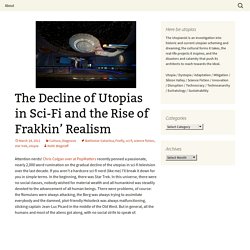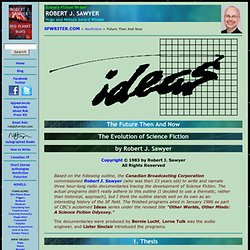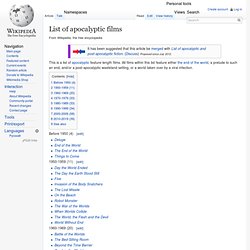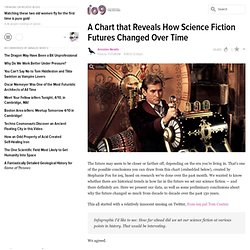

Top 15 Great Science Fiction Books. Books There are so many astounding science fiction books out there that this has been one of the hardest lists for me to put together.

I have added and culled but finally I have a list of the most important 15 Science Fiction Books of all time. I realise that not everyone will be satisfied with this list – so please use the comments to add the books that I couldn’t due to space and time. In no particular order… 1. The Time Machine was first published in 1895, making it the oldest book on this list. Buy it at Amazon 2. Stranger in a strange land tells the story of Valentine Michael Smith, a human raised by Martians on the planet Mars, upon his return to Earth in early adulthood. Buy it at Amazon 3. The Decline of Utopias in Sci-Fi and the Rise of Frakkin’ Realism. Attention nerds!

Chris Colgan over at PopMatters recently penned a passionate, nearly 2,000 word rumination on the gradual decline of the utopias in sci-fi television over the last decade. If you aren’t a hardcore sci-fi nerd (like me) I’ll break it down for you in simple terms. In the beginning, there was Star Trek. In this universe, there were no social classes, nobody wished for material wealth and all humankind was steadily devoted to the advancement of all human beings. There were problems, of course: the Romulans were always attacking, the Borg was always trying to assimilate everybody and the damned, plot-friendly Holodeck was always malfunctioning, sticking captain Jean-Luc Picard in the middle of the Old West. That lead to Battlestar Galactica, perhaps the most serious in tone of any sci-fi series ever. Beyond the Wall: An Investigation into the Relationship Between Industrial Design and Science Fiction.
6 Eerily Specific Inventions Predicted in Science Fiction. H.G.

Wells Predicts the Atomic Bomb in 1914 Decades before the atom bomb was even a glimmer behind Einstein's bifocals, H.G. Wells had already written a novel about it, 1914's The World Set Free. Note that Wells didn't know at this time that a nuclear detonation was actually possible -- he just knew a little bit about radioactive decay and thought that, if we ever figured out a way to blow it all up at once, it would probably make a really big bang.
There's more. Making H.G. "In the map of nearly every country of the world three or four or more red circles, a score of miles in diameter, mark the position of the dying atomic bombs and the death areas that men have been forced to abandon around them. It was in this speculative novel that H.G. "It just, like, came to me. Theory and research. Science Fiction Writer Robert J. Sawyer: The Evolution of Science Fiction. SFWRITER.COM > Nonfiction > Future Then And Now The Evolution of Science Fiction by Robert J.

Sawyer Copyright © 1983 by Robert J. Sawyer All Rights Reserved Based on the following outline, the Canadian Broadcasting Corporation commissioned Robert J. I have some ideas about Science Fiction that I would like to share with your listeners. Science Fiction for three reasons: It is more than just another brand of storytelling. Evolution because the development of SF is analogous to the development of a life form, seeking a favourable niche in the human environment. As a Literary Form because SF is literature, although it wasn't always recognized as such. In the Twentieth Century because I believe SF is less than one hundred years old. In North America because that's where it all happened. Canada has produced a large body of world-class fiction and scholarship in the field. Each program will consist of: I identify five periods in SF's development, to be covered as follows: Broadcast Yourself. List of apocalyptic films. List of apocalyptic films From Wikipedia, the free encyclopedia Jump to: navigation, search This is a list of apocalyptic feature-length films.

All films within this list feature either the end of the world, a prelude to such an end, and/or a post-apocalyptic wasteland setting, or a world taken over by a viral infection. Contents [hide] Before 1950 (4)[edit] 1950-1959 (11)[edit] 1960-1969 (20)[edit] 1970-1979 (33)[edit] 1980-1989 (33)[edit] 1990-1999 (34)[edit] 2000-2009 (58)[edit] 2010-2019 (39)[edit] See also[edit] Retrieved from " Categories: Hidden categories: Navigation menu Personal tools Namespaces Variants Views Actions.
A Chart that Reveals How Science Fiction Futures Changed Over Time. One thing that fascinates me about SF is what gets rejected as proper, serious science fiction over time.

Up until 1980, there were dozens of short stories and novels published every year about psi powers and telepathy, some of which were nominated for or won the major awards in the field, and at least a few of which were considered the finest the genre had to offer — Sturgeon's More Than Human, Heinlein's Stranger in a Strange Land, Silverberg's Dying Inside. In fact, John W. Campbell Jr., who was one of the genre's dominant editors from the '30s until his death in the early '70s, was a deep and sincere believer in the reality of psionics. After that, though, you saw very few straight SF novels about the subject — it was mostly seen in comics like Uncanny X-Men, or horror/suspense books by King and Koontz, "science fantasy" like Bradley's Darkover novels, or media and related tie-ins like Star Wars, Star Trek, etc.